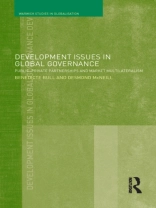Development Issues in Global Governance presents the first serious academic study of multilateral organizations’ current partnerships with the private sector.
This new volume describes empirically, and analyzes theoretically, the impact of such partnerships on the practices, legitimacy and authority of the parties involved. With detailed case studies of key international bodies, including the World Health Organization (WHO), the International Labour Organization (ILO), the World Bank, and the UN»s Education, Science and Communication Organization (UNESCO), the reader is given a clear understanding of present debates in this critical area of world affairs.
This invaluable book:
- includes fresh case studies that deal with five different industries: pharmaceuticals, software, water supply, tobacco and chocolate
- provides an overview of the scope of the phenomenon of partnerships in the multilateral system, and classification of different types
- is based on detailed qualitative research, including extensive interviews in the multilateral organizations
- places the findings in a rigorous theoretical framework, relating them to current trends in international politics and international political economy
- examines the challenges contained in the Millennium Development Goals: the provision of drugs to HIV/AIDS patients and vaccination for all children; the bridging of the digital divide; combating child labour; and the provision of clean water to the poor.
The authors conclude that we are witnessing the emergence of a new institutional form, best characterized as ‘market multilateralism’. They argue that although transnational corporations have become heavily involved with multilateral organizations, these partnerships are crafted to deal with specific instances of market failure, while the guiding principles of the global economy remain unchallenged.
This book will be of great interest to all students of development studies, international relations, political science and business management.












